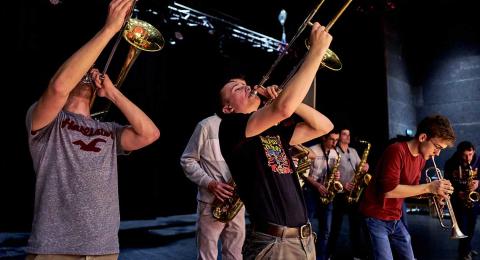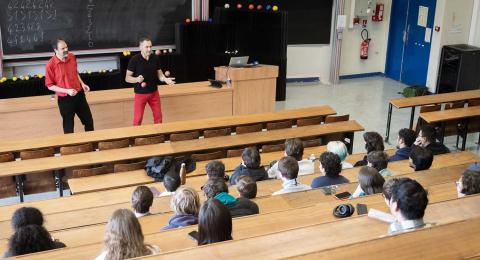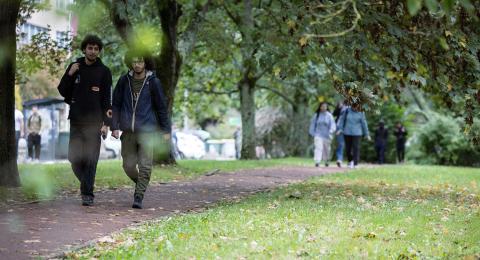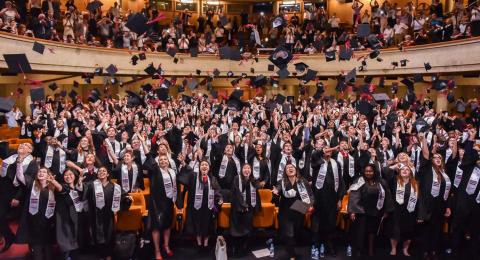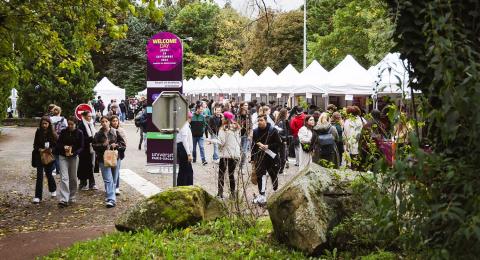The vigorous development of Systems and Synthetic Biology constitutes a huge challenge that must be met both from the research and education perspectives. M2 SSB represents the first step towards nurturing a new brand of researchers and engineers to face up to the challenge.
During the first semester, from September to end of January, students must attend 5 core compulsory modules and 5 elective modules (chosen among 12), for a total of 30 European Credits (ECTS). Refresher courses in either biology or mathematics and computer science are also proposed.
The second semester, from February to end of July, consists in a 6–months research training. Students may perform this internship in one of the academic laboratories or biotechnology companies located on site or elsewhere in France or abroad.
Informations
Compétences
- Apply engineering approaches to biology.
- Design, model and predict the behavior of biological synthetic parts, circuits and chassis.
- Recommend and execute experimental plans to engineer and test synthetic biological systems.
- Integrate concepts and technologies across disciplinary boundaries.
- Conceive and develop collaborative research work within interdisciplinary teams with applications in Systems & Synthetic Biology (iGEM).
- Anticipate the economical and societal challenges of synthetic biology to plan future career paths.
Objectifs pédagogiques de la formation
The aim of M2 SSB is to provide students from the Life Sciences, Mathematics, Engineering, Chemistry, Physical and Computer Sciences a mean to fruitfully engage in collaborative work across disciplinary boundaries, with applications in Systems & Synthetic Biology. Students undertaking the course will gain hands-on experience in experimental biology, modeling and designing. They will also enhance transversal capacities including planning a project, giving a seminar, perceiving the industrial, economical and ethical issues associated with these developing fields.
Débouchés
Professionnels
Après un Master ou Master + Doctorat : ingénieur (R&D, contrôle, production…)
Après un Master ou Master + Doctorat : chercheur ou enseignant-chercheur
Après un Master ou Master + Doctorat : ingénieur (recherche-développement, contrôle, production…) dans les domaines santé, pharmacie, agroalimentaire, biotechnologies, instruments et réactifs, cosmétique, dépollution et environnement
Secteurs d'activité : recherche fondamentale ou appliquée en Biologie, Santé ou Écologie dans le monde académique ou dans le secteur privé
Après Master + Doctorat : chercheur ou enseignant-chercheur
Après un Master ou Master + Doctorat : ingénieur (recherche et développement, contrôle, production…)
Ingénieur d’études / de recherche dans un service R&D dans l’industrie ophtalmique
Après un Master : Data scientist
Après un master : Chargé(e) d’études
Ingenieur R&D
Responsable de projets R&D
Responsable de projets R et D
Chef de projet
Ingénieur d’études dans les domaines de l’industrie
Ingénieur d’études dans les domaines de la recherche
Ingénieur d'études industrie / recherche publique
Enseignants-chercheurs
Ingénieur.e d’études
Ingénieur.e recherche & développement
Chargé.e de recherche et innovation
Chargé·e de projet
Ingénieur.e en production
Chef·fe de projet en biotechnologies, biothérapies ou innovation en santé
Ingénieur.e recherche et développement
Entreprises du secteur privé, dont production agricole
Technicien(ne) supérieur(e) méthodes
Technicien(ne) supérieur(e) production
Technicien(ne) supérieur(e) chargé(e) du développement de produit
Responsable de laboratoire
Ingénieur de recherche ou d'études
métiers de la recherche
enseignant.e-chercheur.se (après un doctorat)
ingénieur.e d'étude
ingénieur.e de recherche
Ingénieur d'études
Ingénieur de recherche
Ingénieur développement
Poursuite d’études
Biologie-AgroSciences
Chercheur/chercheuse en R&D ou expert·e en modélisation et analyse de données dans des entreprises ou laboratoires de pointe.
Data Scientist, Data Analyst, Ingénieur·e en Machine Learning dans des secteurs innovants (tech, finance, santé, énergie, etc.) ;
Doctorat
Doctorat en Bioinformatique
Doctorat en Chimie / Biologie
Doctorat / PhD interdisciplinaire en Science de la durabilité (nombreuses disciplines possibles)
Ingénierie études, recherche et développement
Les étudiants titulaires d’un M2 ont la possibilité de poursuivre dans la recherche en doctorat
Thèse de doctorat
Tarifs et bourses
Les montants peuvent varier selon les formations et votre situation.
Voie d’accès
Capacité d’accueil
Places
Public visé et prérequis
Applicants may come from Universities or from Engineering schools. After a first year of master (M1), or an equivalent qualification (4 years of successful higher education after finishing high-school), in either Biology, applied Mathematics, Computer Science, Chemistry or Physics. Bi-disciplinary curriculums including biology is favored, but highly-achieving and motivated students in any of the cited disciplines can apply.
Période(s) de candidature
Du 21/01/2026 au 04/07/2026
Pièces justificatives
Obligatoires
Lettre de motivation.
Tous les relevés de notes des années/semestres validés depuis le BAC à la date de la candidature.
Curriculum Vitae.
Facultatives
Lettre de recommandation ou évaluation de stage.
Pièce libre.
Tout document ou toute réalisation qui pourrait appuyer la candidature (étude de cas, création d'événement, etc.).
Dossier VAPP (obligatoire pour toutes les personnes demandant une validation des acquis pour accéder à la formation) https://www.universite-paris-saclay.fr/formation/formation-continue/validation-des-acquis-de-lexperience.
D’éventuelles lettres de recommandation.
Document justificatif des candidats exilés ayant un statut de réfugié, protection subsidiaire ou protection temporaire en France ou à l’étranger (facultatif mais recommandé, un seul document à fournir) :
- Carte de séjour mention réfugié du pays du premier asile
- OU récépissé mention réfugié du pays du premier asile
- OU document du Haut Commissariat des Nations unies pour les réfugiés reconnaissant le statut de réfugié
- OU récépissé mention réfugié délivré en France
- OU carte de séjour avec mention réfugié délivré en France
- OU document faisant état du statut de bénéficiaire de la protection subsidiaire en France ou à l’étranger.






